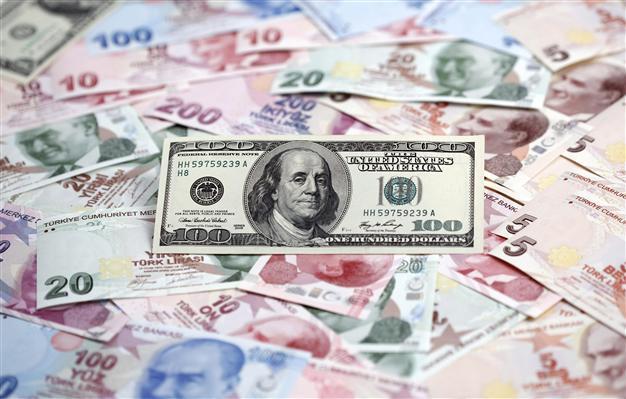Turkish Central Bank intervenes to lift lira from record lows
ISTANBUL - Agence France-Presse

The lira continued its freefall on Jan 23, but the Turkish Central Bank took steps to open the parachutes. REUTERS photo
The beleaguered Turkish lira recovered from alltime lows on Jan. 23 after the Central Bank intervened in foreign exchange markets directly for the first time in two years.The lira tumbled to 3.1061 to the euro and 2.2909 to the dollar in early trade but recovered to 3.0994 and 2.2688 by midday after the central bank action.
The currency has plunged about 10 percent since mid-December - hitting new lows almost daily this year - battered by the political turmoil and concerns about its gaping currency account deficit.
The bank said in a statement it was intervening with direct foreign-exchange sales because of "unhealthy price developments".
Bankers estimated it had spent between $1.5 billion and $2 billion to prop up the currency as it neared the key threshhold of 2.3 to the dollar.
Ali Çakıroğlu, senior investment strategist at HSBC Bank, said it was an "aggressive intervention" by the bank.
"However, it is only a temporary measure," he warned. "Because the market needs motivation. This could be done either by increasing additional tightening days, or explicitly raising interbank rates to nine percent."
The Central Bank has so far refrained from hiking interest rates to defend the lira with the government reluctant to jeopardise its growth and inflation targets.
At its highly-anticipated monthly policy meeting on Jan. 21, it said it was holding its key overnight rate at 7.75 percent.
However, it gave itself room for manoeuvre, saying it would raise interbank rates to nine percent on "additional monetary tightening days" -- nevertheless confusing the markets about its intentions.
At the World Economic Forum in Davos, Turkey's Deputy Prime Minister Ali Babacan told Bloomberg HT television the government did not have any exchange rate targets but said the negative economic impact of the currency volatility was limited.
"It is the first time since January 2012 that the central bank has resorted to direct intervention in the market by directly calling banks to sell currency," Deniz Çiçek, an economist at Turkey's Finansbank, told AFP. The independent bank has previously sold dollars through auctions. On Wednesday, the Turkish treasury sold around $2.5 billion debt through the issue of a 10-year dollar denominated eurobond, the first of the year.
Turkey, like other emerging markets, is vulnerable to the US Federal Reserve's plans to taper its monetary stimulus as it reduces access to cheaper funds to cover its account deficit, currently at over 7.0 percent of gross domestic product.
Analysts are forecasting a further slide in the lira because of the political tensions and tepid economic growth, with some suggesting a level of 2.35 to the dollar over 12 months.
The government has insisted that its growth target of four percent for this year remains intact but the European Bank for Reconstruction and Development on Tuesday cut its forecast to 3.3 percent. Turkey is currently rated at investment grade Baa3 by Moody's Investors Service, BB+ by Standard & Poor's and BBB- by Fitch Ratings.
















